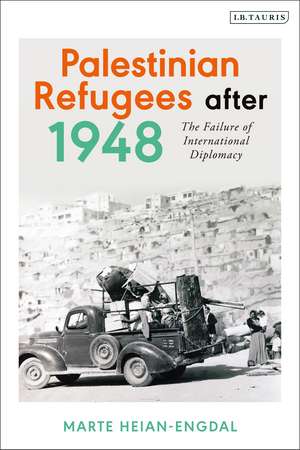Palestinian Refugees after 1948: The Failure of International Diplomacy
Autor Marte Heian-Engdalen Limba Engleză Hardback – 19 feb 2020
| Toate formatele și edițiile | Preț | Express |
|---|---|---|
| Paperback (1) | 217.09 lei 6-8 săpt. | |
| Bloomsbury Publishing – 25 aug 2021 | 217.09 lei 6-8 săpt. | |
| Hardback (1) | 597.63 lei 6-8 săpt. | |
| Bloomsbury Publishing – 19 feb 2020 | 597.63 lei 6-8 săpt. |
Preț: 597.63 lei
Preț vechi: 811.01 lei
-26% Nou
Puncte Express: 896
Preț estimativ în valută:
114.35€ • 119.41$ • 94.43£
114.35€ • 119.41$ • 94.43£
Carte tipărită la comandă
Livrare economică 15-29 aprilie
Preluare comenzi: 021 569.72.76
Specificații
ISBN-13: 9781788312264
ISBN-10: 1788312260
Pagini: 224
Dimensiuni: 156 x 234 mm
Greutate: 0.48 kg
Editura: Bloomsbury Publishing
Colecția I.B.Tauris
Locul publicării:London, United Kingdom
ISBN-10: 1788312260
Pagini: 224
Dimensiuni: 156 x 234 mm
Greutate: 0.48 kg
Editura: Bloomsbury Publishing
Colecția I.B.Tauris
Locul publicării:London, United Kingdom
Caracteristici
First comprehensive analysis of international efforts to solve the Palestinian refugee problem between 1948 and 1968
Notă biografică
Marte Heian-Engdal is Senior Adviser at NOREF Norwegian Centre for Conflict Resolution, an independent foundation working for the peaceful resolution of armed conflicts. She has worked as Associate Professor in History at the University of Oslo and as Senior Researcher at the Peace Research Institute in Oslo (PRIO).
Cuprins
1. Introduction2. From Principles to Practicalities: Repatriation versus Resettlement3. A Beautiful Dream: the Rise and Fall of Project Alpha4. The United States and the Palestinian refugee issue5. The Johnson Mission: A Real college try?6. Kennedy and the Arab-Israeli conflict7. The end of the road for the Johnson Mission8. The 1967 War: Changed Parameters of the Arab-Israeli Conflict9. Conclusion
Recenzii
Marte Heian-Engdal's book on the multiple failures to address seriously the issue of Palestinian refugees following the tumultuous events of 1947-49 fills an important gap in the literature. The initial reaction of the United Nations was to call for repatriation of refugees or compensation for lost properties of those who chose not to return. A Palestine Conciliation Commission was established to start the diplomatic effort to find an acceptable solution to the refugee problem. But all of this came to naught. Heian-Engdal has thoroughly researched the sources to explain why. Her primary explanation is that the United States, the dominant power concerning this issue in the post World War II period, was never able or willing to devote the energy or resources to forging an agreement between Israel and the various Arab actors, including the Palestinians. A major reason, well before the existence of an organized pro-Israel lobby in the United States, was the presence of important "friends of Israel" around U.S. presidents who were able to exert influence at crucial moments. With the outbreak of the 1967 war, the refugee issue became less important than the state-to-state relations of Israel and its Arab neighbors. This is a sobering and thought-provoking account of an issue that still affects millions of people in the Middle East and has immeasurably complicated the search for a comprehensive Arab-Israeli peace.
This is an impressive study - well-researched, well-organized, and well-written - that surely will make a real contribution to our understanding of the politics of the Palestinian refugee problem. Marte Heian-Engdal has plumbed many archival materials and other hitherto-unused primary sources to focus on a largely under-studied dimension of the problem: the international relations questions surrounding the crucial 'repatriation vs. resettlement' debates that were so important in the twenty years after the 1948 Arab-Israeli War. With discussion of how to resolve the Palestinian refugee plight still relevant today, this book is quite timely, and helps answer why the refugees have continued to languish in exile all these decades
This is an impressive study - well-researched, well-organized, and well-written - that surely will make a real contribution to our understanding of the politics of the Palestinian refugee problem. Marte Heian-Engdal has plumbed many archival materials and other hitherto-unused primary sources to focus on a largely under-studied dimension of the problem: the international relations questions surrounding the crucial 'repatriation vs. resettlement' debates that were so important in the twenty years after the 1948 Arab-Israeli War. With discussion of how to resolve the Palestinian refugee plight still relevant today, this book is quite timely, and helps answer why the refugees have continued to languish in exile all these decades
